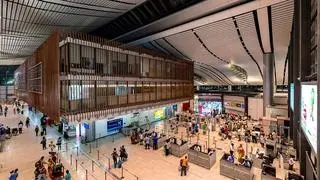It is easier to move goods across countries in Europe than between States in India, says Reiner A. Allgeier, Managing Director, Schenker India, a group company of the €39-billion German railway firm Deutsche Bahn (DB). But that would change when India gets into the goods and services tax (GST) regime, says Allgeier.
In an interview with Business Line , Allgeier hoped that the dedicated rail freight corridor project in India comes up fast and on time. Excerpts:
What are the assets of DB Schenker in India?
As we work on an asset light model, we don’t have a lot of fixed assets.
So, we have dedicated warehouses on long-term lease of 15-20 years.
We have sub-contracted fleet for road services, where we manage the fleet. All our warehouses are branded DB Schenker. At present we have over 30 of our own Schenker Logistics Centres.
In total, we operate warehousing in 53 locations. In 23 locations, they are either customer’s facilities or where facilities are not fully dedicated to us.
We have over 50 dedicated trucks, which are branded DB Schenker. Also, we operate 200-300 trucks on a daily basis.
Deutsche Bahn has identified India as a place for future investments. Can you share some numbers?
No, I cannot. But, we will clearly invest here in our capability of national distribution because it is our key strength in Germany and Europe. India is also a large country in area terms and it is a perfect field for us to transfer this knowledge and capability from Europe to India.
In your 30-plus years spent in the group, you have been exposed to different countries, including many in Europe. What is easier? Moving goods across countries in Europe or moving goods between different States in India?
(With a laugh and pause) Well, I think it’s still easier to do that in Europe than in India. But, I believe that India is on a good road there and the coming of GST should help.
By what percentage would costs go down if GST regime were to come in?
Well, I believe, with GST, logistics and distribution costs in India could go down by 10-15 per cent.
Now, many of our customers are forced to have several warehouses in every State.
But, in future, it could become possible to have, may be just three large distribution centres — one in North, one in Centre and one in South. That will lead to consolidation and lower costs.
But don't countries in Europe have separate tax levels and doesn't that impact goods movement?
Not in real sense of Europe, where we have over 20 countries. The flow of goods traffic is completely harmonised.
Why are you planning to increase warehouse space in India by 50 per cent this year despite a slowing economy?
For contract logistics, the market is growing, not shrinking. Increasingly, following the global practice, companies are outsourcing their logistics and warehousing functions and they give it to specialists like DB Schenker, who they think can do the job more economically. There is a 10-15 per cent growth in India in contract logistics. There are contracts that even stipulate the extent by which costs should reduce every year.
Can you name sectors and some customers?
I wouldn’t name specific customers. But, we have hi-tech (phones to computers) customers, industrial (engineering machinery), automotive, retail and fashion. We are also currently developing the healthcare sector.
Recently, we had a nice win in retail and fashion, where we have been awarded 30,000 sq-feet finished good warehouse in Bangalore. Even though imports and exports are stagnant, one European multinational operating in hi-tech and medical field has awarded a contract of 1,500 tonnes of airfreight and about 2,000 twenty foot equivalent units of ocean freight import, which is a positive development.
Can you share volumes of business for India, with the inter-modal split?
We handle about 80,000 tonnes in air, 79,000-80,000 TEUs in ocean every year. We do not cover that as a statistic for the business in land, as are primarily in contract logistics.
We only track footprint or area of warehouse managed by us, which will touch two million square feet by this year-end. Our intra-India business is contract logistics, where the warehousing and value added service component compared to transportation is 80:20.
Is there a rail transportation component in your business in India?
There is a rail component but we don’t do it directly. That happens when our goods are delivered at inland container depots, which is under the control of the shipping line.
Does DB Schenker India has any involvement with Schenker Rail, your sister company?
No. Schenker Rail operates trains in Europe.
Schenker Rail operates a Europe-China service. Are there any such plans involving India?
They operate two freight train lines from China to Europe. But they are not within China. To answer your next question, is anything planned for India? I would say no.







Comments
Comments have to be in English, and in full sentences. They cannot be abusive or personal. Please abide by our community guidelines for posting your comments.
We have migrated to a new commenting platform. If you are already a registered user of TheHindu Businessline and logged in, you may continue to engage with our articles. If you do not have an account please register and login to post comments. Users can access their older comments by logging into their accounts on Vuukle.